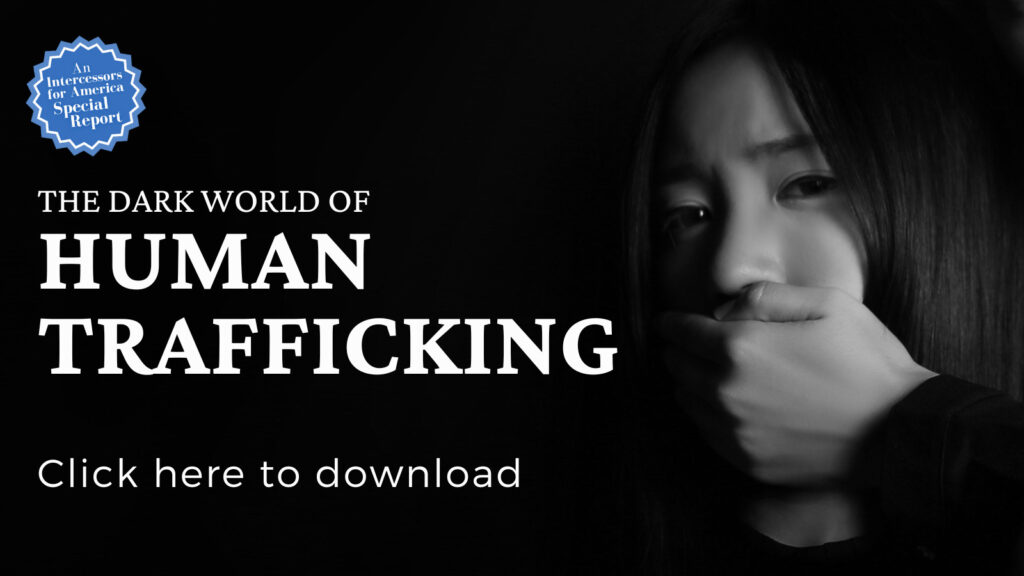 Reading Time: 4 minutes
Reading Time: 4 minutes
Approximately 50 million people around the world are being exploited in human trafficking right now. This 150-billion-dollar industry has evolved into a complex network of organized crime trafficking sex, labor, and human organs. Prayer and action are needed to combat the demonic enterprise of human trafficking.
On a recent Pray With America’s Leaders broadcast, IFA’s Kris Kubal talked with Noel Thomas, co-founder of Zero Trafficking, an organization that develops and utilizes machine-learning augmented analysis to bring military-grade intelligence to the fight against human trafficking.
Do you want state prayer alerts?
Kris opens the interview referencing Sound of Freedom, the 2023 movie about child sex trafficking. Based on a true story, this movie provides a jolting glimpse into the hellscape of horror that is the dark underworld of human trafficking. The film leaves an indelible gash on the human soul, causing many to cry out, “What can I do?” Noel Thomas has personally answered that call and trains others to do the same.
Noel’s soon-to-be-released book, Dark Traffic: The Dangerous Intersection of Technology, Crime, Money, Sex, and Humanity, informs readers how they can help identify and stop trafficking that occurs close to home in their own neighborhoods. Dark Traffic will change all of our perceptions of trafficking.
What Is Human Trafficking?
Human trafficking is criminal activity in which people are recruited, harbored, transported, bought, or kidnapped to serve an exploitive purpose, such as sexual slavery, forced labor, child soldiery, or harvesting human organs. In the interview, Noel describes the first time he witnessed sex trafficking. While in India on a mission trip, he witnessed a 14-year-old girl being trafficked with the cooperation of the local police.
That experience changed the trajectory of his life forever.
Trafficking in the third world looks very different from the first world. In the third world, trafficking happens out in the open, particularly in tourist areas. I work with an organization that rescues bar girls in Angeles City, Philippines. On the main strip, a mile of bars, 20,000 girls are being exploited while bribed and corrupt local police sit idly by.
In the Western first world, the nefarious syndicate is just as pernicious but more carefully hidden. “Everyone thinks that it’s on the coasts or at the border. But it’s happening in rural areas, affluent areas, small towns, and retirement communities.” Noel continued to explain that there is most likely some form of trafficking “a half mile or mile from your house.”
Noel went on to say, “I was surprised to learn there are over 27,000 illicit massage establishments here in the U.S. Many of the women working in these establishments are tricked, thinking they were coming to work as nail technicians and one day get a student visa. But once they arrive, unable to speak the language, they are exploited. They lose control of their passports and don’t have freedom of movement. Fraud and coercion are used to ensnare the individual, which is the basic definition of human trafficking.”
Noel describes the sophisticated networks of systems and businesses required to support this notorious netherworld. The web to sustain human trafficking spans across 30 industries, including transportation, finance, hospitality, social media, dating apps, cryptocurrency, and online gaming, to name a few.
“We know the internet is the most dangerous place for our kids.”
He urges parents to be vigilant to protect their children from adult predators who pose as children online. Gaming apps like Roblox and Minecraft are high-risk arena’s because the approachers are shockingly brazen in the way they lure children into a trusting relationship online.
One of the most shocking facts Noel reveals involves the economics of trafficking. “Human trafficking is unique when compared to other illicit trade. Unlike trafficking weapons or drugs, which can only be sold once, a victim of trafficking can be sold up to 20 times per day. So organized crime, terrorist organizations, and cartels have discovered human trafficking is extremely lucrative and is used to fund other illegal operations.”
What Can We Do?
First, we must choose the uncomfortable path and become more aware of the plight of the trafficked. Remember those in prison as though you were in prison with them, and those who are ill-treated as if you too felt their torment (Hebrews 13:3).
Second, we must pray. Arise, O Lord; O God, lift up Your hand. Do not forget the helpless (Psalms 10:12). In my work in the Philippines, through the power of prayer we are watching revival break out in the sex trade. Not only are the precious daughters of the King being rescued, healed, restored, and educated, but also the power of God is transforming the city. Men on the strip are repenting of their sins, bar owners have welcomed us to host worship and Bible study for the girls on Sunday mornings, and bar workers are getting baptized and delivered from demons.
Third, please visit Noel’s website and purchase his new book so you can learn how to join the movement actively dismantling criminal networks. Situational awareness is one area in which we all need to grow.
As Noel and Kris ended the interview, he said, “The harvest is plentiful, but the workers are few. We’ve got such an opportunity as the body of Christ, our collective churches, and places of worship to come together and agree to be unifiers in a fragmented nation around this issue. As a country and as a society, we should take this issue seriously and give a voice to the voiceless of human trafficking.”
You can watch the interview here:
Share this article to mobilize prayer against trafficking in America.
Keith Guinta blogs at www.winepatch.org. He is a husband and father, and he has been a worship leader and church planter. Photo Credit: Tim Tebow Foundation on Unsplash.

